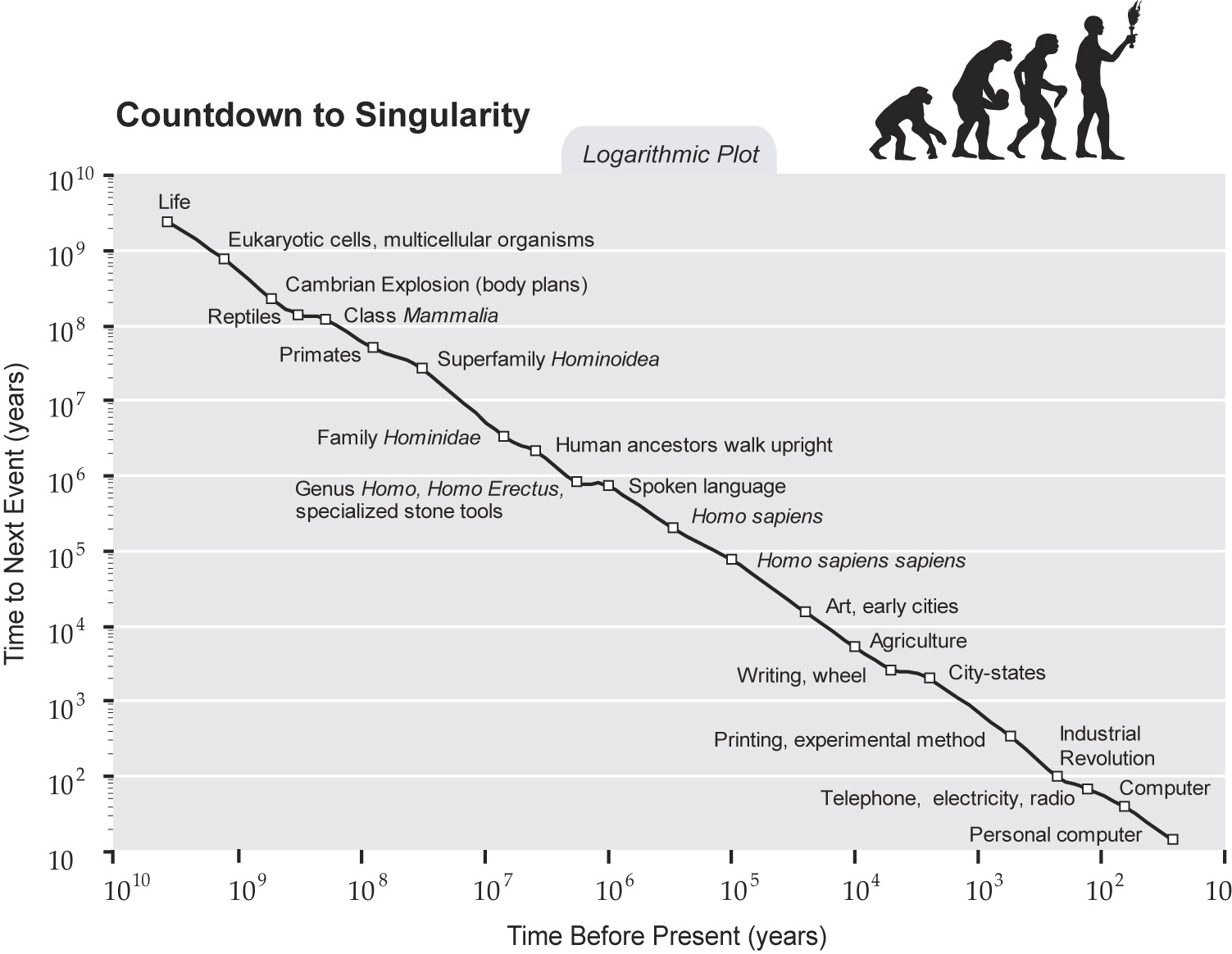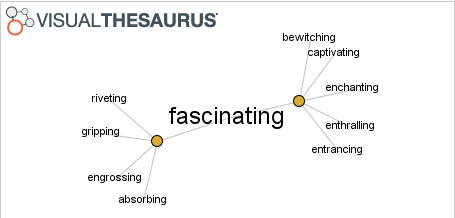
Twenty years or so ago, I bumped into the Singularity. And somehow, it ended up sucking the joy out of my life.
I read Eric Drexler’s The Engines of Creation, Hans Moravec’s Mind Children, and I joined the Extropian’s mailing list. Suddenly the science fiction which I’d been reading, which I had accepted as a rough map of the human future, long term, and my own future, short term, became painfully obsolete. Vernor Vinge’s essay on runaway super intelligence, which so terrified Bill Joy formerly of Sun Microsystems that he began to argue against our headlong flight into the future of AI, was a turning point for me.
The Future, Joy said, might not need us. It certainly didn’t need most of the science fiction I’d been reading.
The singularity scared the crap out of me.
Heinlein’s Future History, already long in the tooth, had dissolved long ago. Asimov’s wonderfully mathematically predictable Galactic Empire, his well-behaved human sized and shaped robots, vanished. Niven’s Known Space was a construct only a shade less retrograde than EE Doc Smith’s Civilization (capital C) of the Lens of Arisia. Even David Brin’s Uplift Universe, felt suddenly flimsy, absurd.
Where was the runaway superintelligence? The bush-robots with a billion nanoscale tentacles transforming matter into fluid dreamlike possibility?
All my beloved SF was simply make believe. Fantasy, like Narnia, like the Lord of the Rings; only fantasy with delusions of possibility, embarrassing delusions at that.
Somewhere along the way, That Universe We All Dreamed Of, of spaceships and empires and alien races, became a TV show, first and foremost, in my mind. A television show carefully rigged not to upset us. Humans, and human-like aliens, in charge. No immortality–death is meaningful! What a relief, that! Can you imagine if it wasn’t? If we were the last generation doomed to die? Wouldn’t that be HORRIBLE?
Oh, sure, even on TV, there were brushes with Godlike beings, but generally these Gods were even more childish than the human characters who confronted t hem, and like Superman’s Mister Mxyzptlk, they were outsmarted every 42 minutes. Our machines never become smarter than we are, though we occasionally create one like Data, who was our equal. But we always break the mold, after making him.
Human level AI, in these shows, is always an oddity, a side kick, comic relief, Pinnochio, a pet.
And merging with our technology? Um. No. That’s just rape, Look at the Borg. Real humans don’t merge with anything.
So in my ‘serious’ SF I stuck to the Gibsonian near future. When Gibson and Sterling foresaw the next 30 years of American politics in the essay “The Privatization of Public Space,” in the 80s, a vast perversely enjoyable literary dystopia opened up, characterized by staggering income inequality, vicious anti-heroes and moral ambiguity, ascendant information technology, and nascent, childlike – godlike AI (this AI was unaware of the runaway Vinge essay, I guess) seeping in around the edges.
Here was a place full of stories. Here was the present writ large, for Gibson told us, SF was about the present, and we all pretended we’d known that all along.
One of the things that kept my storyteller in Gibson’s shadow was Extropians. A group of science fictional types interested in a lot of typical science fictional things; immortality, life-extenstion, information technology, and the components of the singularity; artificial intelligence, human / AI hybrids, uploadable identity, nanotechnology and Nearly Infinite Everything.
You might have thought such people would have interesting things to say about the many potential shapes of the future, of societies disconnected from the scarcity that characterized so much of human history. You would be wrong, though, because to a man, and they were almost all men, these people were fundamentalist right-wing libertarians, hostile to every and all public institution that has ever existed outside the free market.
The libertarian lover of the Rule of Law, that can’t abide, well, a Legislature.
I recall only one other progressive dumb enough to subject himself to the angry libertarian boot stamping the human face forever, Charlie Stross. He mostly laid low, absorbed the interesting and tuned out the silly noise, and has created more fiction about the Singularity than any other writer to date, I’m guessing.
I’m guessing, because I’ve never been able to make myself read any.
I gave up on SF, on being a fiction writer; I did other things. I raised two kids. I played in the dot.com bubble. I wept, underemployed in its aftermath–it was almost as if the libertarians of Extropia had detected that I was being paid too much money, and shut the whole thing down. I watched peers grow rich, cash out. I swirled around these events, a kind of outsider, and a kind of insider / visionary, because to some degree, the world had become Science Fiction, and I was living it–working on the global computer network for God’s sake.
And now, my kids old enough to be tired of me, I find myself staring at the collected works of The Singularity; new stuff by Drexler and Moravec and Kurzweil, at the fiction of Charlie Stross and others. I’m reading it all now, as if it were, well, a job. Because I love science fiction, and I’m going to write it again. I am writing it again.
I sold four stories to Asimovs in 2013. So far.
I can do this. I am doing this. But I’m still finding my way. But I’m no longer afraid of the Singularity; I’m not sure why.
In part, because everyone I know who actually works in AI finds the short-term time frames of Kurzweil and Moravec silly. In part, because I’m learning, finally, not to take ideas so… personally. And in part because I like fantasy, science fantasy, too. This is why we have Steampunk and Retro SF and Star Trek and Star Wars and Dr. Who, still. it’s fun to think about a long term future without a Singularity. And one can do that, plausibly, by picking away at any of the many tenets of Post humanism.
I’m not going to let a bunch of angry libertarians own the future.
An Extropian once explained that the moneyless utopia of Star Trek would never exist, because in the end, carbon atoms were scarce, and he needed to build a brain the size of jupiter. Freeloading Hippies would not be tolerated, would not be allowed to stand in the way of his Jupiter Sized Brain. So I packed up my bag of tricks and went home, twenty years ago.
Well, I’m back.
Whatever the Singularity might be, or not be, might become, it will be informed by the culture that creates it and I am part of that culture. I’m going to argue for any number of entertaining possilbities, Utopian, Dystopian, but mostly that In Between state that seems to most closely resemble Reality.
Interesting times, to be sure.
Stay tuned. What my reasoning lacks in rigor, it makes up for with perverse fun.
To infinity, and Beyond, to borrow a phrase from a cartoon toy. To make art out of crap, as Michael Swanwick told me I would do one day, at Clarion. To Boldly Go.
Yeah!


